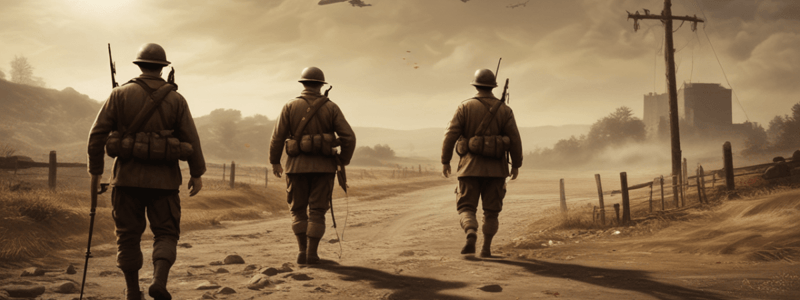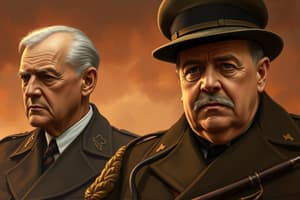Podcast
Questions and Answers
What was the occupation of Ken Cooke's father?
What was the occupation of Ken Cooke's father?
- Office boy
- Infantryman
- Factory worker (correct)
- Factory owner
What was the name of the ship that took Ken Cooke from Southampton to the beaches of Normandy?
What was the name of the ship that took Ken Cooke from Southampton to the beaches of Normandy?
- Empire Rapier (correct)
- Landing Craft 1
- Gold Beach Ferry
- HMS Normandy
What was the approximate number of British soldiers who landed on Gold Beach on D-Day?
What was the approximate number of British soldiers who landed on Gold Beach on D-Day?
- 24,969 (correct)
- 20,000
- 30,000
- 10,000
What was Ken Cooke's age when he landed on Gold Beach?
What was Ken Cooke's age when he landed on Gold Beach?
What was the name of the regiment that Ken Cooke was a part of?
What was the name of the regiment that Ken Cooke was a part of?
What was the total number of ships involved in the D-Day invasion?
What was the total number of ships involved in the D-Day invasion?
What was Cooke's task when he first encountered Germans?
What was Cooke's task when he first encountered Germans?
What did Cooke notice about one of the German soldiers pretending to be dead?
What did Cooke notice about one of the German soldiers pretending to be dead?
What did Cooke and his comrades hear on their first night in the German trenches?
What did Cooke and his comrades hear on their first night in the German trenches?
What happened to Cooke on July 4th?
What happened to Cooke on July 4th?
What did the SS chap refuse in the field hospital?
What did the SS chap refuse in the field hospital?
What happened to Cooke after his injury?
What happened to Cooke after his injury?
What event made Cooke realize the seriousness of the war?
What event made Cooke realize the seriousness of the war?
What happened to Cooke after the war?
What happened to Cooke after the war?
What was Cooke's job in the Royal Ordnance factory?
What was Cooke's job in the Royal Ordnance factory?
What was the purpose of the inoculation during basic training?
What was the purpose of the inoculation during basic training?
Where did Cooke receive his basic training?
Where did Cooke receive his basic training?
What was the time when Cooke landed on the beach on D-day?
What was the time when Cooke landed on the beach on D-day?
What was the soldiers' primary objective after landing on the beach?
What was the soldiers' primary objective after landing on the beach?
What was Cooke's reaction to the bullets buzzing around him on the beach?
What was Cooke's reaction to the bullets buzzing around him on the beach?
What was Ken Cooke's task when he first encountered Germans?
What was Ken Cooke's task when he first encountered Germans?
Ken Cooke was injured on June 4th.
Ken Cooke was injured on June 4th.
What did Ken Cooke see in the gutter?
What did Ken Cooke see in the gutter?
Ken Cooke fought on to the ______________________.
Ken Cooke fought on to the ______________________.
Match the following events with the corresponding location:
Match the following events with the corresponding location:
What did the SS chap refuse in the field hospital?
What did the SS chap refuse in the field hospital?
Ken Cooke's war experience ended after his injury.
Ken Cooke's war experience ended after his injury.
What triggered Ken Cooke's realization of the seriousness of the war?
What triggered Ken Cooke's realization of the seriousness of the war?
What was the approximate number of men involved in the D-Day invasion?
What was the approximate number of men involved in the D-Day invasion?
Ken Cooke was nervous when he boarded the ship to Normandy.
Ken Cooke was nervous when he boarded the ship to Normandy.
What was Ken Cooke's role in the war?
What was Ken Cooke's role in the war?
Ken Cooke was one of the last men standing of the _______ Normandy Veterans Association.
Ken Cooke was one of the last men standing of the _______ Normandy Veterans Association.
Match the following descriptions with the correct locations:
Match the following descriptions with the correct locations:
What was Ken Cooke's job before joining the army?
What was Ken Cooke's job before joining the army?
Ken Cooke was excited to go to war when he received his call-up letter.
Ken Cooke was excited to go to war when he received his call-up letter.
What was Ken Cooke's experience with the sea before D-Day?
What was Ken Cooke's experience with the sea before D-Day?
The soldiers were given ________ rounds to shoot during their training.
The soldiers were given ________ rounds to shoot during their training.
Match the following events with the time they occurred on D-Day:
Match the following events with the time they occurred on D-Day:
Flashcards are hidden until you start studying
Study Notes
Ken Cooke's D-Day Experience
- Ken Cooke, 98, was an 18-year-old infantryman in the 7th battalion of the Green Howards (Yorkshire regiment) during the D-Day invasion of Normandy on June 6, 1944.
- He was part of the massive Allied force of 160,000 men, 3,000 landing craft, 2,500 ships, and 500 ancillary craft and merchant vessels.
Pre-War Life
- Cooke left school at 14 in 1939 and worked with his father in a Royal Ordnance factory, ferrying cups of tea and messages between the workers constructing anti-aircraft weapons.
- He recalls a burly police officer arresting a man in the office for allegedly spying for the Germans.
- His father was called up to serve as a medic, and Cooke was called up in 1943, shortly before Christmas.
Training and Deployment
- Cooke underwent basic training in Richmond, which included haircuts, inoculations, and marching drills.
- He was moved between barracks, eventually ending up at an American camp just outside Southampton.
- On June 5, 1944, he was told to get his gear together and boarded the Empire Rapier, a landing craft.
D-Day Landing
- Cooke's landing craft stopped about two feet from the beach at 7:45 am, and he stepped into six inches of water while bullets buzzed overhead.
- He was tasked with getting off the beach as swiftly as possible, leaving behind any wounded comrades.
- He and his fellow soldiers traversed the beach quickly, and Cooke does not recall firing his weapon that day.
Post-Landing and Injuries
- Cooke and his fellow soldiers were tasked with "hedge hopping" through the countryside, clearing villages of German troops.
- He was injured on July 4, 1944, when a shell exploded near him, and he was treated in a field hospital.
- Cooke was shipped back to England, where he underwent surgery and rehabilitation.
Later War Experience
- After rehabilitation, Cooke received a letter to report to Leeds in February 1945 and eventually joined the Highland Light Infantry.
- He fought on to the Rhine, crossing in a canoe-type vessel.
- His war eventually ended outside Bremen.
Post-War Life
- Cooke worked at Rowntree's confectionery company in York, where he met his wife, Joan, and retired over four decades later.
- He started speaking about his war experiences in the 1990s, and his recollections were used in an award-winning verbatim play, Bomb Happy.
Ken Cooke's D-Day Experience
- Ken Cooke, 98, was an 18-year-old infantryman in the 7th battalion of the Green Howards (Yorkshire regiment) during the D-Day invasion of Normandy on June 6, 1944.
- He was part of the massive Allied force of 160,000 men, 3,000 landing craft, 2,500 ships, and 500 ancillary craft and merchant vessels.
Pre-War Life
- Cooke left school at 14 in 1939 and worked with his father in a Royal Ordnance factory, ferrying cups of tea and messages between the workers constructing anti-aircraft weapons.
- He recalls a burly police officer arresting a man in the office for allegedly spying for the Germans.
- His father was called up to serve as a medic, and Cooke was called up in 1943, shortly before Christmas.
Training and Deployment
- Cooke underwent basic training in Richmond, which included haircuts, inoculations, and marching drills.
- He was moved between barracks, eventually ending up at an American camp just outside Southampton.
- On June 5, 1944, he was told to get his gear together and boarded the Empire Rapier, a landing craft.
D-Day Landing
- Cooke's landing craft stopped about two feet from the beach at 7:45 am, and he stepped into six inches of water while bullets buzzed overhead.
- He was tasked with getting off the beach as swiftly as possible, leaving behind any wounded comrades.
- He and his fellow soldiers traversed the beach quickly, and Cooke does not recall firing his weapon that day.
Post-Landing and Injuries
- Cooke and his fellow soldiers were tasked with "hedge hopping" through the countryside, clearing villages of German troops.
- He was injured on July 4, 1944, when a shell exploded near him, and he was treated in a field hospital.
- Cooke was shipped back to England, where he underwent surgery and rehabilitation.
Later War Experience
- After rehabilitation, Cooke received a letter to report to Leeds in February 1945 and eventually joined the Highland Light Infantry.
- He fought on to the Rhine, crossing in a canoe-type vessel.
- His war eventually ended outside Bremen.
Post-War Life
- Cooke worked at Rowntree's confectionery company in York, where he met his wife, Joan, and retired over four decades later.
- He started speaking about his war experiences in the 1990s, and his recollections were used in an award-winning verbatim play, Bomb Happy.
Studying That Suits You
Use AI to generate personalized quizzes and flashcards to suit your learning preferences.




